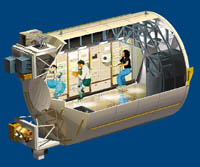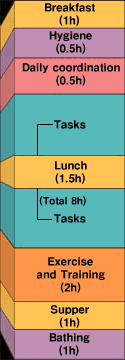Full
of functions to support experiments and daily lives.
Facilities inside the
International Space Station
Six
"Experiment Modules" utilized by participating countries
The United States of America, Japan, Europe and Russia are developing
experiment modules of their own. A total of six modules will be the working area
of the Astronauts in ISS. Since there is almost no gravity, astronauts will float
inside ISS, so to fix an astronaut's body, foot restraints will be utilized. Hand-rails
will be available to move to other locations.
| 
ESA/ducros |
| "Habitation
area" for sleeping, dining and exercise
The habitation
area provides housing for astronauts. Two modules are planned, with the US and
Russia providing one module each. The habitation area will provide facilities
needed to support astronauts' healthy life such as a sleeping conpartment, shower
room, toilet, and exercise area.
| |
| - A sample of an astronaut's daily schedule
Each
astronaut will be given an individual daily schedule. Basically, astronauts will
work eight hours a day. Two day off will be given a week and national holidays
are under consideration. Also, astronauts will have an opportunity to communicate
with their family on the ground once a week.
| Wake up |
 |
| Sleep | |
|
| Q&A About astronaut's life |
Q.1 How will water,
air and electricity be provided ?
Water
and air will initially be transported to ISS where it will then be recycled for
subsequent reuse. Electricity will be generated mainly by large solar panels which
will be rotated to continually face the sun.
Q.2
Do astronauts eat the same food as we do on the ground?
Unlike the Space Shuttle, the ISS habitation module has
a refrigerator and freezer, so vegetables, fruits, and other foods similar to
those on the ground, such as frozen food are provided. In addition, thermostabilized
food is also available, allowing the astronauts to enjoy a menu full of variety.
Q.3 What will the astronauts do
during their free time?
Astronauts
will be allowed to carry certain volume of private items with them to ISS. This
will enable them to spend leisure time similarly as they would do on the ground,
reading books, listening to music, and so forth.
|
|
